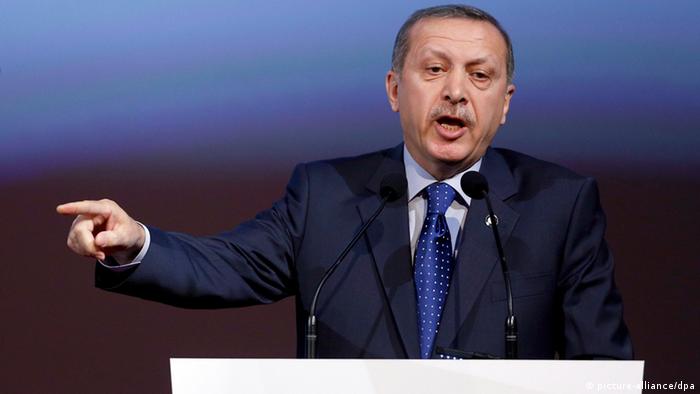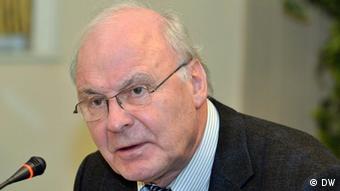Middle East expert Udo Steinbach explains the calculations that could be behind Prime Minister Erdogan's comparison of Zionism and fascism - and whether they will affect German-Turkish relations.
DW: Turkish Prime Minister Recep Tayyip Erdogan's recent statement about Zionism has triggered widespread criticism. He described Zionism as a crime against humanity, comparing it with fascism. Some have accused him of ignorance, some of extremism, while others have celebrated these statements. How do you asses Erdogan's statement?
Udo Steinbach: I think this is due to politics. Mr. Erdogan is trying somehow to cause a stir in the Arab camp - among a people who are standing up and re-organizing themselves. He is naturally trying to score points at home with it. Four years ago there was an incident in Davos: It was just before the Turkish local elections, and there was no doubt that by storming out, Mr. Erdogan was playing to his domestic audience [Erdogan angrily left a 2009 panel discussion on the Gaza war - eds.]. And now, above all I suspect something similar again. That ignorance also plays a role - that he does not understand what Zionism is and how Zionism and fascism and nationalism are defined - may well be true too. But I think he's a populist and has both public spheres in mind: the Arab and the Turkish.
The Zionist movement was the basis for the foundation of a Jewish state. In contrast to the popular anti-Zionist perspective, Erdogan has not denied Israel's right to exist and has always said he had nothing against the Jewish people but was criticizing the policies of the current Israeli government. Were Erdogan's most recent remarks directed against Israeli Prime Minister Benjamin Netanyahu, or were they an ideological statement?
It was probably not an ideological statement. It was highly emotional, and we know, of course, that there is no chemistry between Netanyahu and Erdogan. That may well have played a role. But the bottom line, I think, is that the Turkish prime minister has once again very much targeted his own, Turkish public. Municipal elections will soon be held again - I believe he is trying to score points.
Turning to German-Turkish relations: Right after German Chancellor Angela Merkel returned from Turkey there was a report on the conditions of the German soldiers manning Patriot missiles in Turkey. The Turkish Army strongly rejected the report's criticism and there is now a more conciliatory tone. In the political arena we are accustomed to tensions from time to time, less so in the military. How do you see this incident?
We should not rank it too high on the list. Firstly, the German defense minister has said something that is true: These are different military cultures that are abruptly colliding. The Turkish military, the position of the officers in the military, above all the position of generals - that's just something different than in Germany. If a military policewoman comes and wants to upbraid a Turkish general, then there are reactions. [A German soldier said she was attacked by a Turkish general after she stopped his car - ed.] The mission came about very quickly, and I believe that is another reason why the sanitary conditions and whatever else is now being complained about are not optimum. I find it unfortunate that the parliamentary commissioner for the armed forces went straight to the public. After the visits of the defense minister and the chancellor to the soldiers, it would have been much better to deal with this internally, and I'm really glad that they are now trying to settle this "tempest in a teacup."
In his first years in office, Erdogan drew a great deal of support from Germany. The German press often wrote that he was a reformer who had implemented much more than his predecessors in previous decades. Meanwhile, criticism of him has become loud, especially in Germany. Are the next crises in the Turkish-German relations already preprogrammed?
I do not think it will come to real crises, but rather that there is a new process of mutual redefinition and realignment. That could be seen from the chancellor's visit to Turkey. Turkey has noticed that going it alone in recent years with regard to the Arab has not really brought results. In Europe, people are beginning to realize that binding Turkey closely to the European Union is necessary with a view to the future. If we criticize Mr. Erdogan, then this has to do with a number of circumstances: first, the fact that Turkey has not become more democratic, second, that many of his statements - either in Turkey itself or on his visits to Germany - have not always been helpful, as far as the perspective of integration goes. And, of course, his new comments on Zionism have raised eyebrows in Berlin. But overall, we're in a position to steer Turkish-German relations back out of the valley into which they have fallen in recent years.
Udo Steinbach is a scholar of Islam and until 2007 directed the German Orient Institute. Since June 2012, he is Chairman of the Governance Center Middle East / North Africa at the Humboldt-Viadrina School of Governance in Berlin. DW DE



No comments:
Post a Comment